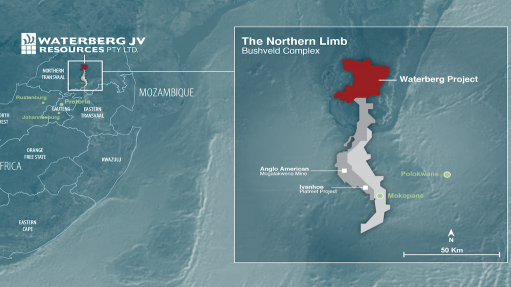
Photo by: Platinum Group Metals
Name of the Project
Waterberg platinum group metals project.
Location
About 85 km north of Mokopane, in Limpopo, South Africa.
Project Owner/s
Waterberg Joint Venture (JV) Resources, or Waterberg JV Co, a JV between Platinum Group Metals, or PTM (37.05%), Impala Platinum Holdings, or Implats (15%), Japan Oil, Gas and Metals National Corporation, or Jogmec (12.195%), Hanwa Co (9.755%) and black economic-empowerment partner Mnombo Wethu Consultants (26%). As a result of PTM's 49.90% ownership in Mnombo, the company has an effective interest in the Waterberg JV of 50.02%.
Project Description
The 2019 definitive feasibility study (DFS) mine plan envisages production of 4.8-million tonnes of ore a year and 420 000 platinum, palladium rhodium and gold, or 4E, ounces a year in concentrate.
The mine will initially access the orebody using two sets of twin decline tunnels, with fully mechanised longhole stoping methods and paste backfill used for mining. Paste backfill allows for a high mining extraction ratio, as mining can be completed next to backfilled stopes without leaving internal pillars.
Maintaining safety and reliability are key mine design criteria. As a result of the scale of the orebody, bulk mining on 20 m to 40 m sublevels using large underground equipment, and conveyors for ore and waste transport, will provide high efficiency.
Potential Job Creation
The project will create about 1 100 new highly skilled jobs.
Net Present Value/Internal Rate of Return
The project has an after-tax net present value, at an 8% discount rate, of $982-million and an internal rate of return of 20.7%. This is based on the 2019 DFS prices of palladium $1 546, platinum $980, gold $1 548 and rhodium $5 036 ($/R:15).
Capital Expenditure
Capital expenditure is estimated at $874-million, including $87-million in contingencies. Peak project funding is estimated at $617-million, based on 2019 commodity prices and costs.
Latest Developments
PTM reported in October 2022 that Waterberg JV Co, had in principle approved a R380-million preconstruction work programme for the Waterberg project, which focuses on early infrastructure, derisking and project optimisation.
An initial budget for the first R45-million of the work programme is to be spent by March 31, 2023, and has been unanimously approved by the Waterberg JV board of directors.
The Waterberg JV has laid out an early infrastructure plan intended to significantly derisk the future construction of the project.
While the programme is being executed, the company plans to continue seeking a third-party concentrate offtake agreement for Waterberg JV and, as a possible alternative, plans to assess the potential establishment of a new smelter and base metals refinery, jointly with third-party investors, which is capable of processing Waterberg concentrate.
The programme will focus on project infrastructure, including initial road access, water supply, essential site facilities, a first phase accommodation lodge, a site construction power supply from State-owned power utility Eskom and advancement of the Waterberg social and labour plan.
An update to the 2019 Waterberg DFS is also planned, including a review of cutoff grades, mining methods, infrastructure plans, scheduling, concentrate offtake, dry stack tailings, costing and other potential revisions to the project’s financial model.
As a precursor to the DFS update, an infill drilling programme has been approved. It targets near surface, modelled inferred mineral resource blocks that have good potential for conversion to higher confidence levels.
Consequently, allowing the blocks to be added to early mine plans potentially reduces early capital expenditure and the period to first mining.
The infill drill programme is budgeted at R23-million and is planned to comprise 16 T Zone NQ boreholes and 16 F Zone NQ boreholes.
Mineralised material recovered from the drill programme will be assayed and the remaining material will be processed to determine dry-stack tailings characteristics and provide additional concentrate metallurgical data.
If dry stack tailings methods are implemented in the DFS update, it is expected that mine water consumption will be reduced by 40% to 50%.
The initial budget for the programme will be funded pro rata by the JV partners and has been coordinated to match fiscal year and budgetary periods for Jogmec and Hanwa.
Subsequent expenditures, in accordance with the programme, are subject to expected approvals for sequential time periods ending on August 31, 2024.
Key Contracts, Suppliers and Consultants
Stantec Consulting International and DRA Projects SA (DFS).
Contact Details for Project Information
PTM, tel +27 11782 2186 or email info@platinumgroupmetals.net.